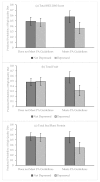Depression and Physical Activity Affect Diet Quality of Foreign-born Latina Women Living on the U.S.-Mexico Border
- PMID: 31159475
- PMCID: PMC6627936
- DOI: 10.3390/nu11061254
Depression and Physical Activity Affect Diet Quality of Foreign-born Latina Women Living on the U.S.-Mexico Border
Abstract
There is increasing evidence that depression may affect diet. However, little is known about the association between depression and diet quality among foreign-born Latinas. We hypothesized that depressive symptoms would be associated with poorer diet quality in foreign-born Latinas. Furthermore, we believed that physical activity (PA) would have a protective effect on diet quality for individuals experiencing depressive symptoms. Our study evaluated the diet (Healthy Eating Index) and PA (Actigraph GT3X activity monitors) of 534 foreign-born Latinas with and without depressive symptoms (Center for Epidemiological Studies Depression Scale). A series of logistic regression models were estimated to examine our hypotheses. As predicted, Latinas who were depressed had significantly lower odds of having a high-quality diet than non-depressed Latinas. Unexpectedly, among Latinas who met PA guidelines, depressed Latinas had a significantly lower probability of having higher-quality diets than their non-depressed counterparts. Our findings support current research stating that depressive symptoms are associated with lower Healthy Eating Index scores. More research is necessary to elucidate the relationship between PA and dietary quality of depressed Latinas. Innovative approaches to address mental health and the stressors that can compound its severity are needed to improve diet quality among foreign-born Latina women.
Keywords: Latina women; depression; diet quality; immigrants; physical activity.
Conflict of interest statement
The authors declare no conflict of interest. The funders had no role in the design of the study; in the collection, analyses, or interpretation of data; in the writing of the manuscript, or in the decision to publish the results.
Figures

Similar articles
-
Comparison of Self-Rated Health Among Latina Immigrants in a Southern U.S. City and a National Sample.Am J Med Sci. 2015 Oct;350(4):290-5. doi: 10.1097/MAJ.0000000000000554. Am J Med Sci. 2015. PMID: 26263236 Free PMC article.
-
Physical activity and acculturation among U.S. Latinas of childbearing age.West J Nurs Res. 2014 Apr;36(4):495-511. doi: 10.1177/0193945913507341. Epub 2013 Oct 9. West J Nurs Res. 2014. PMID: 24107780
-
Parks as Social and Cultural Spaces Among U.S.- and Foreign-Born Latinas.West J Nurs Res. 2018 Oct;40(10):1434-1451. doi: 10.1177/0193945917692310. Epub 2017 Feb 1. West J Nurs Res. 2018. PMID: 28322666
-
Prenatal depression in Latinas in the U.S. and Mexico.Matern Child Health J. 2009 Jul;13(4):567-76. doi: 10.1007/s10995-008-0379-4. Epub 2008 Jun 26. Matern Child Health J. 2009. PMID: 18581222
-
Physiologic and psychosocial changes of the menopause transition in US Latinas: a narrative review.Climacteric. 2021 Jun;24(3):214-228. doi: 10.1080/13697137.2020.1834529. Epub 2020 Nov 11. Climacteric. 2021. PMID: 33174466 Free PMC article. Review.
Cited by
-
Diet Quality and Sociodemographic, Lifestyle, and Health-Related Determinants among People with Depression in Spain: New Evidence from a Cross-Sectional Population-Based Study (2011-2017).Nutrients. 2020 Dec 30;13(1):106. doi: 10.3390/nu13010106. Nutrients. 2020. PMID: 33396825 Free PMC article.
-
The Mediating Role of Perceived Stress and Academic Procrastination between Physical Activity and Depressive Symptoms among Chinese College Students during the COVID-19 Pandemic.Int J Environ Res Public Health. 2022 Dec 31;20(1):773. doi: 10.3390/ijerph20010773. Int J Environ Res Public Health. 2022. PMID: 36613096 Free PMC article.
-
Relationships Between Depressive Symptoms, Dietary Inflammatory Potential, and Sarcopenia: Mediation Analyses.Front Nutr. 2022 Feb 17;9:844917. doi: 10.3389/fnut.2022.844917. eCollection 2022. Front Nutr. 2022. PMID: 35252313 Free PMC article.
-
Prevalence of and Factors Associated with Depressive Symptoms among Indonesian Migrant Workers in Taiwan.Int J Environ Res Public Health. 2023 Feb 24;20(5):4056. doi: 10.3390/ijerph20054056. Int J Environ Res Public Health. 2023. PMID: 36901063 Free PMC article.
-
Relationship between psychological distress and the adherence to the Korean healthy eating index (KHEI): the Korea National Health and Nutrition Examination Survey (KNHANES) 2013 and 2015.Nutr Res Pract. 2021 Aug;15(4):516-527. doi: 10.4162/nrp.2021.15.4.516. Epub 2020 Nov 27. Nutr Res Pract. 2021. PMID: 34349884 Free PMC article.
References
-
- Dixon L.B., Sundquist J., Winkleby M. Differences in energy, nutrient, and food intakes in a US sample of Mexican-American women and men: Findings from the Third National Health and Nutrition Examination Survey, 1988–1994. Am. J. Epidemiol. 2000;152:548–557. doi: 10.1093/aje/152.6.548. - DOI - PubMed
-
- Kandiah J., Yake M., Jones J., Meyer M. Stress influences appetite and comfort food preferences in college women. Nutr. Res. 2006;26:118–123. doi: 10.1016/j.nutres.2005.11.010. - DOI
MeSH terms
Grants and funding
LinkOut - more resources
Full Text Sources
Medical
Research Materials
Miscellaneous

